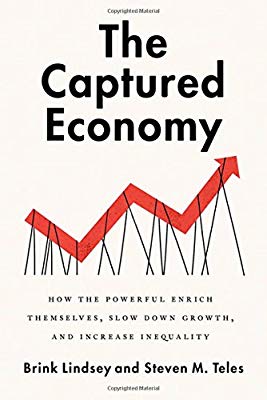Uncategorized
The Captured Economy

I finally had a chance to sit down and read The Captured Economy: How the Powerful Enrich Themselves, Slow Down Growth, and Increase Inequality. It’s a fantastic piece of work, and one that readers of this blog will be especially well-positioned to appreciate.
The book’s authors are Brink Lindsey, a libertarian formerly of the Cato Institute and now director of the Niskanen Center’s Open Society Project, and Steven Teles, a liberal political scientist at Johns Hopkins University. Together, they make a strong “liberaltarian” argument that rent-seeking is slowing down American economic growth while simultaneously increasing economic inequality.
That general point will hardly be surprising to readers of this blog. But the book really shines in the detailed analysis it provides of four kinds of rent-seeking that, the authors claim, are especially responsible for our current economic malaise: regulation of the financial sector, intellectual property laws, occupational licensing, and land use regulation. In the four central chapters of the book devoted to these topics, the authors work through in detail how each of these areas of regulation both undermine economic growth, and redistribute wealth upwards, from the poor and middle-classes to the better off.
The book also makes a novel contribution in the proposals it sets forth to remedy the problem of rent-seeking. The authors reject as a “non-starter” the libertarian idea that the way to control rent-seeking is to sharply limit the size and scope of government. Of course, that solution might work if we were able to actually implement it. But given the popularity of many of the redistributive and regulatory functions that American government currently serves, the project of reducing government to a mere night-watchman is well outside of the Overton Window.
Instead, the authors propose increased political deliberation as a feasible and reasonably effective counter to rent-seeking. I was skeptical at first, and still am to a degree. But the idea here isn’t simply that we should all talk more. Instead, the authors propose a fairly detailed and sophisticated set of institutional reforms designed to generate impartial information and to create venues of decision-making that do not give preferential access to the interests of the financially or organizationally advantaged.
I’ve read a lot of work in public choice theory, and I still learned a great deal from this book. Moreover, it’s an excellent book for use in courses, especially for those of you who are teaching in Philosophy, Politics & Economics (PPE) programs. The analysis is sophisticated enough for upper-level undergraduate or graduate coursework, but the book as a whole is also quite accessible and engaging. I could easily imagine assigning the whole thing, but any of the four chapters on financial regulation, IP, occupational licensing, and land-use regulation would make an excellent stand-alone piece as well.
Highly recommended!

